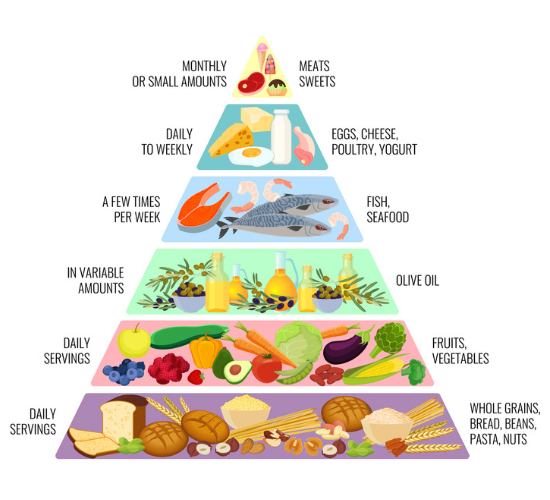Living Well With Liver Disease
Living with liver disease will be different for each person, and it may even be different for you each day.
Looking after your body and making healthy lifestyle changes go a long way to reducing your risk of further liver damage.
Having liver disease can increase your risk of catching infectious diseases and developing serious symptoms.
One way to protect yourself is to keep up to date with your vaccinations. The National Immunisation Program funds a number of vaccines for people with certain medical conditions, including:
- Pneumococcal
- Meningococcal
- Influenza
- Hepatitis B.
Talk to your doctor or liver specialist to check if vaccinations are right for you.
Eating a balanced diet is one of the most important ways to keep yourself well.
Many liver specialists and nutrition experts recommend the Mediterranean Pattern of Eating (or Mediterranean Diet) to keep our bodies healthy and functioning at their best. In addition, following this pattern of eating can reduce the progression of fatty liver even in the absence of significant weight loss.
What is the Mediterranean Pattern of Eating?
The Mediterranean Pattern of Eating is based on the traditional foods eaten by people from countries bordering the Mediterranean Sea and consists of healthy whole foods with very few processed foods.
The healthy food combinations in the Mediterranean Pattern of Eating have been found to have a range of benefits including antioxidant and anti-inflammatory properties. Research has found people who followed this pattern of eating had a lower risk of many lifestyle diseases including fatty liver disease.

Key Mediterranean foods
- Extra virgin olive oil
- Vegetables and fruit
- Wholegrain bread and cereals
- Legumes and beans
Tips to embrace the Mediterranean Pattern of Eating into your diet
- Replace oils, margarines and butter with extra virgin olive oil
- Replace meat with more vegetables
- Add legumes into mince dishes
- Switch red meats for fish or poultry
- Add nuts to salads.
More information
View the Qld Health Mediterranean Diet factsheet for more information on the Mediterranean Pattern of Eating including meal and snack ideas.
If you have liver disease keeping to a healthy weight is an important part of helping your body stay well and preventing complications. Being overweight can speed up liver damage and even make some treatments less effective. Research shows losing 3-10% of your body weight can have an impact on liver disease.
The best approach to losing weight is to make healthy lifestyle changes.
Managing your kilojoule intake
Be aware of the amount of kilojoules (energy) in the food you eat. This can assist you to work out if you are consuming more kilojoules than your body is using.
Way to reduce your kilojoule intake include:
- Make water your main drink
- Swap high energy foods with healthier choices
- Use smaller plates and bowls to help reduce portion sizes
- Plan your meals to avoid the temptation to have takeaway
Increasing your physical activity
Combining a healthy diet with an increase in physical activity will help you to reach your weight loss goals.
Many physical activities can fit into your daily life. For instance, taking the stairs instead of the lift, physically playing with your children or grandchildren, taking public transport or cycling. You may find it helpful to join an exercise group or sports team for motivation and support.
Get support
Talk to your doctor if you need support in maintaining a healthy weight. Depending on the type of liver disease you may need to make special considerations or be referred to allied support services.
- Aim for 30 minutes of exercise per day
- You don’t have to run marathons or join a gym. Choose an exercise you can do often and find easy and enjoyable.
- Talk to your doctor about getting referred to an exercise physiologist.
Ideas to get moving:
- Walking is a great way to get started. There are many walking groups you can join or even videos you can follow online.
- Council swimming pools are a low-cost option for swimming laps or aqua aerobics classes.
- Explore a bush trail with a friend
- Join a dance class
Drinking alcohol when you already have existing liver damage can worsen your condition.
The Australian Alcohol Guidelines provide advice on reducing the health risks from drinking alcohol. However, these guidelines may not be suitable for someone with liver disease.
Check with your doctor whether it is safe for you to drink any alcohol and how much. Read more about alcohol and your liver
It’s no surprise that smoking is bad for anyone’s health. If you have a liver condition smoking increases your risk of further liver damage, scarring and liver cancer.
There are many different ways you can reduce or quit smoking. Learn about the different methods to see what might work best for you.
The benefit and quality of over-the-counter herbal supplements can vary greatly, even for those without liver disease.
Herbal supplements can be toxic to your liver or cause any treatments to be less effective. Therefore, it is important to talk to your doctor or liver specialist before taking any herbal supplements.

